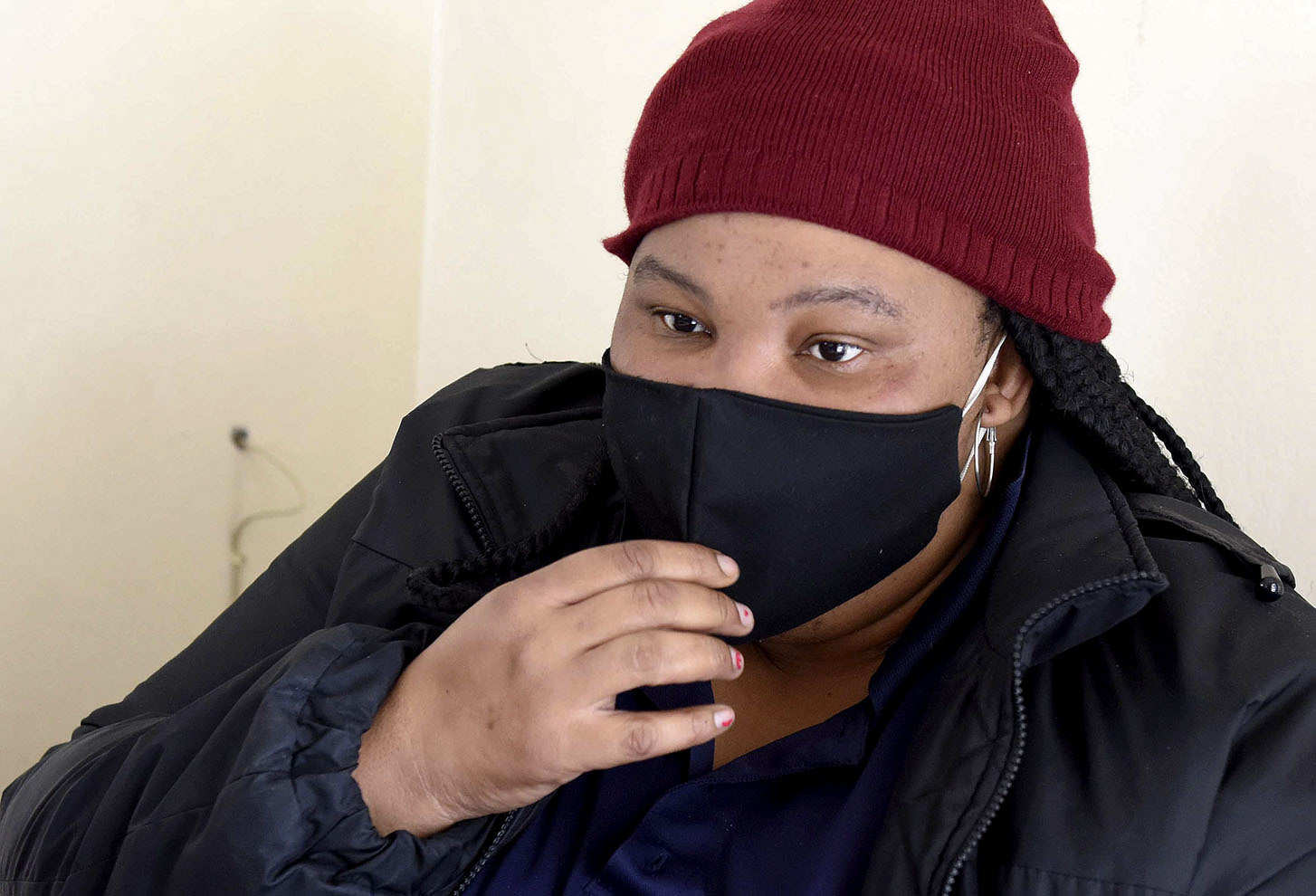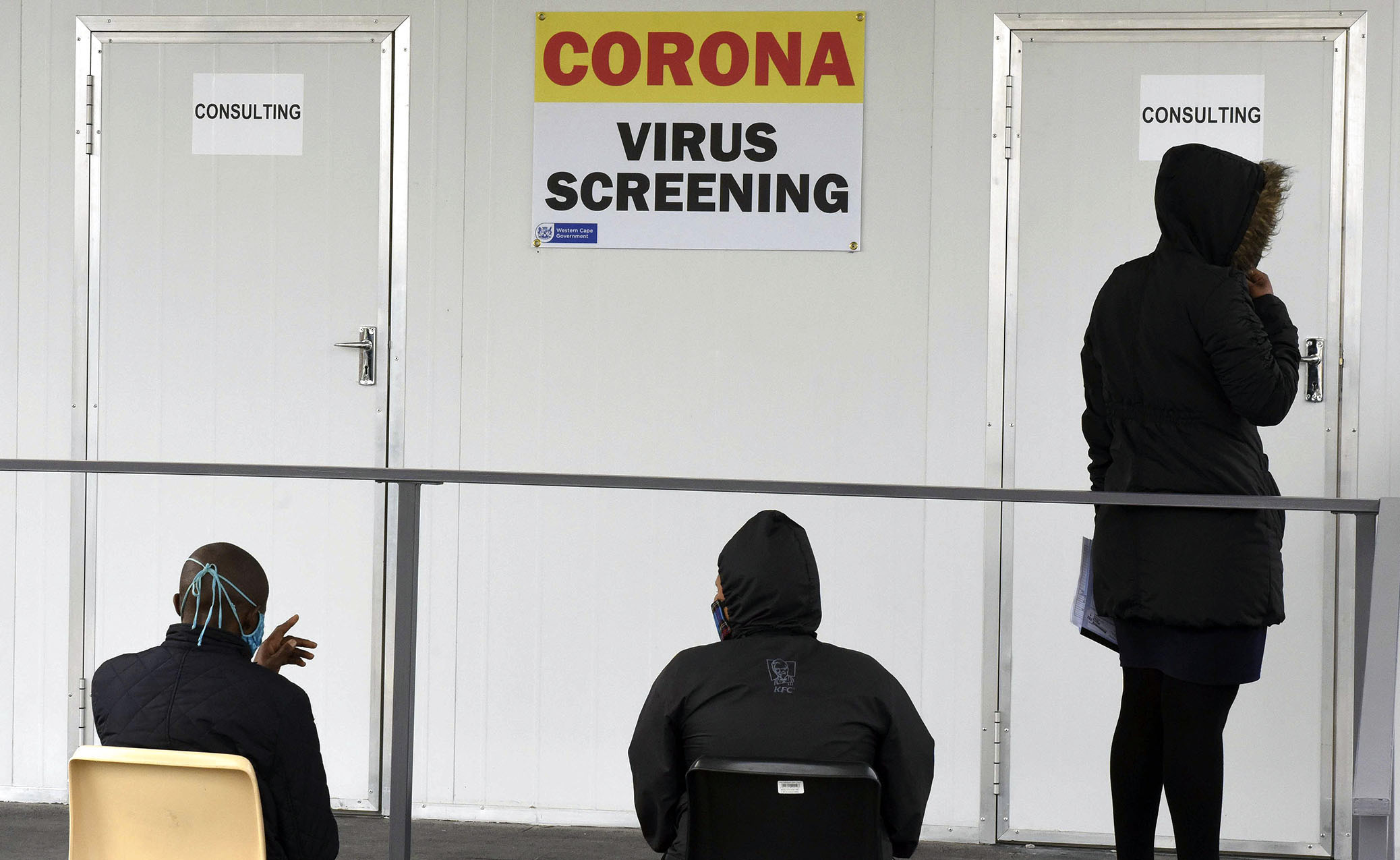 Community members waiting at the Site B CHC in Khayelitsha. (Photo: Nasief Manie/Spotlight)
Community members waiting at the Site B CHC in Khayelitsha. (Photo: Nasief Manie/Spotlight)
Community health committees (CHCs), also called clinic committees, can be a powerful link between the community and primary healthcare facilities. Many clinic committee members, however, feel sidelined in the government’s Covid-19 response.
Some told Spotlight they get little to no support from government and are not provided with personal protective equipment. During lockdown, this meant many clinic committee members have had to stay at home, leaving little to no oversight of health services at clinics at a time when many clinics are temporarily closed whenever a staff member tests positive — leaving patients to seek care elsewhere.
Why do clinic committees matter?
According to Professor Leslie London, head of the Division of Public Health Medicine at the University of Cape Town’s School of Public Health and Family Medicine, CHCs play an important role in primary healthcare, but this role and the powers of these committees have been a grey area since long before Covid-19.
London says in 2003, when the National Health Act was adopted and gave powers to clinic committees, it did not specify what these committees should do and who their members should be.
It was left to the provinces to decide.
CHCs include a (primary healthcare) facility manager, ward councillor and representatives from the community. With some CHC members nominated by the community and others appointed by provincial health MECs, their role is to provide oversight and accountability on how primary healthcare facilities are managed.
“For a long time, there was no legislation, so it was difficult for them to fully execute their roles,” says London, adding that each province deals with clinic committees differently.
 Mzwanya Ndibongo, chair of the Khayelitsha Health Forum, training volunteers to help with COVID-19 cases. (Photo: Nasief Manie/Spotlight)
Mzwanya Ndibongo, chair of the Khayelitsha Health Forum, training volunteers to help with COVID-19 cases. (Photo: Nasief Manie/Spotlight)
Not fully utilised
Fast-forward to the Covid-19 pandemic and, London says, CHCs could have been better utilised to fight the pandemic.
“Many of the health committee members are active citizens. They can help with Covid-19, but they couldn’t easily do their work because they’re not fully supported. There was no protective equipment given to them. Those who [did get it] from the clinic [did so because of] the relationship they have with the facility managers,” he says.
 Tamara Sam, secretary of the Khayelitsha Health Forum, says when COVID-19 hit the province, clinic committees were “kicked aside”. (Photo: Nasief Manie/Spotlight)
Tamara Sam, secretary of the Khayelitsha Health Forum, says when COVID-19 hit the province, clinic committees were “kicked aside”. (Photo: Nasief Manie/Spotlight)
Tamara Sam, secretary of the Khayelitsha Health Forum, says when Covid-19 hit the province, clinic committees were “kicked aside and not roped in to help”.
“When the country was shut down and we were on level five, we couldn’t work. People were calling us and complaining about issues in their communities and we couldn’t do anything. We sat and watched as things got out of hand and we decided to write to the MEC so that we [could] get permits. We only got permits for the chairperson and the secretary,” says Sam.
By Thursday 23 July 2020, the Khayelitsha subdistrict had recorded 7,504 positive cases.
“When cases were increasing by the day, we knew we had to play our role and ensure that regulations were followed. We had to go out to the communities and explain and emphasise the washing of hands and why it is important. We had to tell people why they need to wear masks and how it was going to help our area. We started WhatsApp groups to disseminate information. We called and worked with various stakeholders to ensure lockdown rules were adhered to.”
The forum also lends a hand at a quarantine site set up at the Thusong Centre in Khayelitsha.
“Things are not easy,” explains Sam. “People are still not adhering to the rules for quarantine. We now have to be health committees and counsellors at the same time, because those in quarantine are complaining to families outside about issues in the quarantine centre.
“We get phone calls from people crying, saying they want to come out, people are dying at the centre. So we have to talk to both parties and make them understand what is going on,” she says.
This work is mostly funded from their own pockets, she explains, as there is no stipend or any form of compensation for the work they do.
Empowering communities through CHCs
Co-ordinator for the People’s Health Movement (PHM-SA) Tinashe Njanji says CHCs across the Cape Town Metro have been hard at work, educating communities, assisting with isolation and quarantine, de-escalating potential community conflict when cases of infection have been noted and encouraging hand-washing and sanitising in communities.
“Now that we see the epidemic has far outstripped the ability of the health service to screen and test in communities, we are more reliant on community action to control the spread of Covid-19. So, we need community voices that are trusted to mobilise safety in our community spaces,” says Njanji.
View from Eastern Cape
Noxolo Mafumana, a committee member of the District Health Forum in Nelson Mandela Bay in Eastern Cape, says she and colleagues do what they do out of love for their community. Their work is voluntary and they receive only R500 quarterly, which covers airtime or transport.
“It’s not even easy to get the money. Payments are not being made. There are no approval letters for clinic committees. We have to fight. How do we work like this?” she asks.
“Our suggestions [to facilities’ management] always fall on deaf ears, but when things start to go wrong and our suggestions were not taken into consideration, that is when they remember there is a structure called CHCs.
Some facility managers listen, others ignore health committees. When they want our help to protect them against the community, they know us. So, we can’t really say we work well together. We only work well when there is trouble brewing,” Mafumana says.
Thembisile Nogambula, the forum’s chairperson, says CHCs provide oversight, social mobilisation and health advocacy.
“CHCs should know their roles, but you find out some of them do not. They end up being sent to get fruit by facility managers or nurses.”
Nogambula says CHCs are instrumental in monitoring whether clinics are meeting immunisation and other targets. During lockdown, this is especially important as surveys show there has been a significant drop in childhood immunisations.
“We go out to the community and encourage them to take their children for immunisation and to go for their chronic medications. We take part in quality assurance and resolving complaints and ensuring that the complaints box is opened at least once a week,” he says.
View from the Western Cape
Back in Western Cape, Christine Jansen, Manenberg Health Committee chairperson, says Covid-19 has affected the way members work. For example, they are not going to clinics as often as they would like to.
“Ward councillors are not sharing much information with us,” she says.
A member of Jansen’s committee, Gadija Da Costa, says one challenge is that information usually “flows from [the] top down”.
“Most of the time we talk to ourselves. No one listens to us. There is a top-down approach which really doesn’t work. We are the people on the ground and we know what the community wants.
“We want services for our community, so we put out suggestions. There is no feedback from facility managers. They don’t sit in our meetings. If we are lucky and they sit in, it’s always a rush. How do we work like this and how do we move things forward, because there is no assistance at all?”
View from Gauteng
CHC members in Gauteng echo many of the sentiments felt in Eastern and Western Cape.
Thandiwe Khatshanyane, a CHC member at Moroka Clinic in Soweto, southwest of Johannesburg, says committee effectiveness largely depends on facility managers.
“At times you get a facility manager who is engaging and open with everything. At times the facility manager doesn’t even want anything to do with us, like they don’t need our assistance. It’s not easy, but we try. Clinics face a lot of challenges like long queues, staff shortages and shortages of medication,” says Khatshanyane.
“Before Covid we would go into a facility and check the queues and also check medications – if they are still within the expiry date – and engage with clients to hear their concerns. The facility managers will inform us of nurses who abscond or are sick, and how that will affect service delivery. We explain that to the patients. Now we can’t do that.”
The struggle to build partnerships
Njanji says health committees are not formally recognised in many provinces. “Even if they are recognised, they do not receive any training or support. They are expected to do this work voluntarily and often do not get compensated for their costs,” he explains.
“Where facility managers recognise the value of health committees, they give them the authority to monitor and bring issues to their attention to resolve problems. They may ask them to provide information to communities and explain some of the challenges with services.
“They should also allow the committees to bring the needs expressed by the community to them, so that these needs are addressed in the facility’s plans. This gives the committee an opportunity to provide input on planning for health services,” says Njanji.
But CHC members like Leslie Sylvester, a member of the Manenberg Health Forum, says they “have zero power”.
“We don’t have a say and it’s difficult to do what we do. Information is filtered from top to bottom. On paper, we have powers, but in reality we don’t have a say. It’s never a two-way conversation. Nobody comes to the party when we have planning sessions or outreach events. It is a tremendous battle to get the big guys, like councillors and facility managers, to sit down and listen to our suggestions. They are always in a rush and we can’t sit in a meeting like civilised people and express what needs to happen in our facilities,” he says.
Russell Rensburg, director at the Rural Health Advocacy Project, believes there is significant scope for improvement.
“There is a lot that needs to be fixed. There are a lot of overlapping and competing structures that should be reformed and roles clearly defined,” he says.
Departmental response
Nomawethu Sbukwana, spokesperson for Western Cape Health MEC Nomafrench Mbombo, says “each facility was given the discretion” as to whether they wanted committee members to offer assistance at facilities or not.
“This is in light of the fact that their travelling to and being in the facility does come with safety risks for the members and others,” she says.
Sbukwana confirms there is no stipend, with CHC community members serving on a volunteer basis. “There is, however, room to claim for transport costs to and from meetings, which must be claimed from the facility they serve,” she explains.
Sbukwana acknowledges CHCs’ oversight powers to encourage and ensure accountability and stewardship of resources at a clinic. “They assist the community to effectively communicate its needs, concerns and complaints,” she says.
Health activists like Rensburg, however, argue that such acknowledgement must mean “properly getting them on board, giving them clear guidance, putting the power in their hands, [so] they can be a powerful asset in the community and can do things”.
“Their role is to link the community to the clinic and they should be involved in every aspect of the facility. Above all, there should be a budget for them to be able to do the things they need to do,” he says. DM/MC
This article was produced by Spotlight – health journalism in the public interest. Sign up for our newsletter.





 Tamara Sam, secretary of the Khayelitsha Health Forum, says when COVID-19 hit the province, clinic committees were “kicked aside”. (Photo: Nasief Manie/Spotlight)
Tamara Sam, secretary of the Khayelitsha Health Forum, says when COVID-19 hit the province, clinic committees were “kicked aside”. (Photo: Nasief Manie/Spotlight)